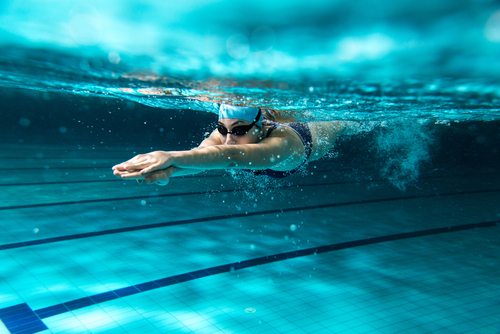Swimming can be only fun but beneficial to a person’s health. In addition to the low-impact nature, it is also great therapeutic exercise which can help treat painful conditions such as arthritis and fibromyalgia. It is also beneficial for individuals in recovery from addiction who seek the therapeutic benefits, exercise component or desire to connect with others who share a similar passion for being in the water.
General Benefits
The United States Water Fitness Association states three of the most important benefits of swimming include buoyancy, resistance and the cooling effects. Approximately 90 percent of the body is buoyant in the pool which takes stress of the joints. Water adds more resistance than air which makes it great exercise.
Physical Therapy
Swimming can reduce pain associated with chronic health conditions. Aerobic exercise can be good for joint pain but being in water can minimize impact and support overall health. Water exercises offer a great way to rebuild strength steadily without taxing the body too much. In recovery from addiction, a person is experiencing physical, mental and spiritual fatigue after a long battle with addiction. All of the drugs or alcohol a person took can really wreak havoc on the body which makes it important to try soothing techniques to support positive physical movement, finding new hobbies (such as swimming, diving or water aerobics) and creating new relationships built when a person tries new things away from individuals still struggling with addiction.
Psychological Benefits
Building cardio and increasing range of motion are great benefits of swimming but it also has mental benefits as well. Heading to the local pool is a great way to relieve stress by interacting with other swimmers and being present in one’s own body. Mental fatigue can play a factor in relapse so it is important to relieve stress and tension through exercise. Let it be a fun activity rather than a ‘must do’ on the list, but enjoy finding a way to get in the water that can be enjoyable for maximum benefit.
To Be Considered
Rehab for an injury or to deal with chronic pain can be beneficial but should be discussed with a treating physician prior to the start of a new exercise regimen. Individuals with addiction or in recovery will also benefit from speaking with a therapist, counselor or doctor to discuss the best workout plan. Some other considerations may include finding ways to share the activity with others so it is not so isolating. People in recovery often struggle with isolation so finding others with whom to share a fun hobby can encourage social engagement.
The Villa supports individuals and families struggling with addiction. Call us if you need help finding the right resources and information to get started on your recovery journey.

